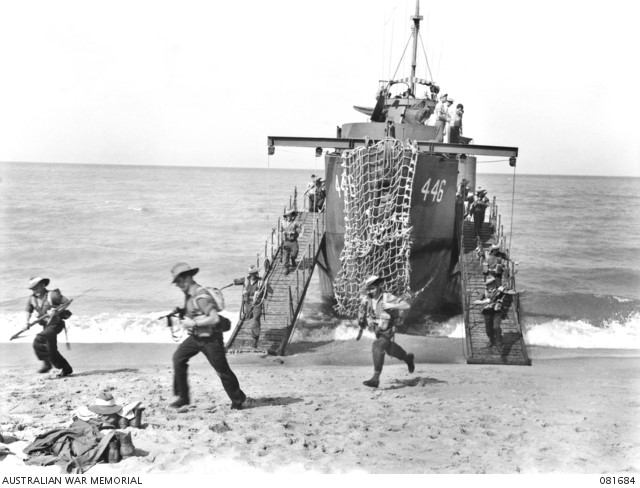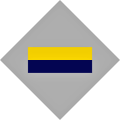On the 30th August 1944, under direction of Lt-Col Phil Roden, an intensified training program began. Highlights of the period which followed was the training in amphibious training at Trinity Beach near Cairns. Royal Marines and two landing ships of the Royal navy which had taken part in the Normandy landings and other operations co-operated in this training.
A fortnight was spent in exercises with the smaller landing craft, in climbing up and down scrambling nets, moving through water and over sand, packing and unpacking, loading and unloading.


The main exercises for the 2/14 men began on 25 October when the battalion embarked on the
L.S.I. Glenearn (below).

The Glenearn was an L.S.L, – Landing Ship Infantry, from which the infantry scrambled down nets into L.C.V.Ps – Landing Craft Vehicle and Personnel – for assault landings. After spending the afternoon and night of 20th October 1944 on board, the 2/14 Battalion commanded by Lt. Col. Phil Roden made two landings on the following morning.
In the afternoon of the same day the Unit re-embarked on L.C.Ls – Landing Craft Infantry, small snub nosed comic strip craft capable of carrying a couple of companies of Infantry. From these a landing was made at Unity Beach some miles up the coast, followed by a half day exercise in deployment, advance and attack following a landing. From there, after a night bivouac on the beach, it was back up to Kairi on October 23rd.



Glenearn Ship’s Telegraphist George Dowling, (above) who had already been involved in the Normandy landings on, remembered his Australian sojourn.
“On returning to our base at Lae in New Guinea we were ordered to Milne Bay and Cairns on Australia’s eastern coastline for the purpose of training the seventh Australian infantry division for possible landings on Borneo. From mid-October to late December 1944 several practice landings were made on beaches between Cairns and Townsville including Trinity Bay, Fitzroy Island, Palm Island and Treger.
The docks at Cairns were too shallow for the Glenearn so we acted independently from Townsville. It was very pleasant, stress free sailing between the coast of Australia and the Great Barrier Reef as enemy submarines could not safely navigate their way through. We sailed with all lights blazing and the crew were able to sit on the upper deck and enjoy the balmy evenings.”
